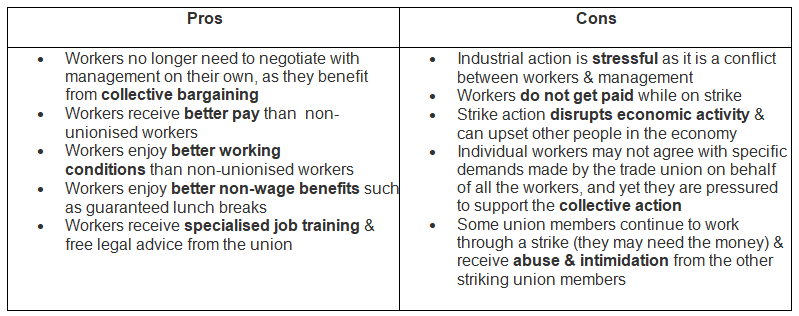Class 10 Exam > Class 10 Notes > Business Studies for GCSE/IGCSE > Trade Unions
Trade Unions | Business Studies for GCSE/IGCSE - Class 10 PDF Download
Trade Unions
- A trade union is an organization that advocates for its members' interests during negotiations with a company's management or proprietors. Its primary goal is to safeguard and promote the welfare of its members within the workplace. While most trade unions maintain independence from employers, they strive to cultivate strong collaborative relationships with them.
- Worker interests encompass various aspects:
- Ensuring fair and equitable wages.
- Access to non-wage employment benefits like training.
- Upholding health and safety standards in the workplace.
- Providing a suitable and conducive work environment.
- Combatting discrimination and preventing worker exploitation.
- Trade unions typically emerge from specific industries, representing workers within those sectors. For example, airline pilots may belong to a pilots' union, while rail and maritime workers may join a rail and maritime union. For instance, the NEA stands as the largest professional employee organization in the USA, advocating for public school teachers and other support staff in colleges and universities.
- Workers contribute a monthly fee to join a trade union, known as a subscription. Membership remains active as long as members continue paying this fee.
Question for Trade UnionsTry yourself: What is the primary goal of a trade union?View Solution
The Effects of Trade Union Membership
- Nearly a quarter of employees in the UK holding permanent positions were affiliated with a trade union in the year 2022.
- Poland stands out with the least trade union membership within the European Union.
- Approximately 70% of the workforce in Scandinavian nations are active trade union members.
- Industries within the public sector exhibit the highest concentration of union memberships.
- Women exhibit a higher likelihood of trade union affiliation compared to men.
- Members of trade unions typically enjoy higher wages than their non-union counterparts.
- Trade unions, when sufficiently large, possess the ability to sway governmental decisions in favor of employees.
The Effects of Trade Union Membership for Employees
Pros & Cons of Trade Unions For Workers
The effects of trade union membership for employers
- Employers face the increasing bargaining power of trade unions as the number of unionized workers from their firm rises.
Advantages and Disadvantages of Trade Unions for Employers

The document Trade Unions | Business Studies for GCSE/IGCSE - Class 10 is a part of the Class 10 Course Business Studies for GCSE/IGCSE.
All you need of Class 10 at this link: Class 10
|
70 videos|93 docs|26 tests
|
FAQs on Trade Unions - Business Studies for GCSE/IGCSE - Class 10
| 1. How does trade union membership impact wages and benefits? |  |
Ans. Trade union membership often leads to higher wages and better benefits for workers. This is because unions negotiate with employers on behalf of their members for better compensation packages, including pay raises, healthcare coverage, and retirement benefits.
| 2. Can trade union membership improve working conditions? |  |
Ans. Yes, trade union membership can improve working conditions for employees. Unions advocate for safe and healthy working environments, as well as fair treatment and respect from employers. Through collective bargaining, unions can secure improvements in working conditions for their members.
| 3. Do trade unions provide job security for their members? |  |
Ans. Trade unions can help provide job security for their members by negotiating for protections against layoffs, outsourcing, and unfair terminations. Union contracts often include provisions that safeguard workers from sudden job losses, offering a sense of stability and security in the workplace.
| 4. How do trade unions advocate for employee rights? |  |
Ans. Trade unions advocate for employee rights by representing workers in disputes with employers, lobbying for legislation that protects workers' rights, and providing legal assistance when needed. Unions play a crucial role in ensuring that workers are treated fairly and have a voice in the workplace.
| 5. Can trade union membership lead to career advancement opportunities? |  |
Ans. Yes, trade union membership can lead to career advancement opportunities for workers. Unions often provide training programs, education assistance, and networking opportunities that can help members develop new skills and advance in their careers. Additionally, unions may advocate for promotion and advancement opportunities for their members within their industries.
Related Searches















